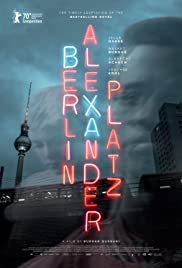
BERLIN ALEXANDERPLATZ
Germany, 2020, 183 minutes, Colour.
Welket Bungue, Albrecht Schuch, Jella Haase, Annabelle Mandeng, Joacjim Krol.
Directed by Burhan Qurbani,
Berlin Alexanderplatz, by Alfred Doblin, is one of Germany’s classic 20th century novels. It was published in 1929, filmed in 1931. It is a story of Berlin and Germany between the wars, before the rise of national socialism and Hitler as Chancellor. In 1980, it became a 14 part television series directed by one of the star directors of the time, Rainer Werner Fassbender. This was the time of the divided Germany, adapting the basic outline of the novel, and its characters, to the period.
This version, running for three hours, brings narrative and characters into the 21st-century.
The central character is Francis (in the original novel, a prisoner being released from jail). This time (and the film opens with two people struggling in deeper waters), Francis is a refugee crossing the Mediterranean, escaping from Guinee-Bissau, arriving in Berlin, no documentation, some guilt about the drowning of his partner during the crossing, labouring in a vast tunnel engineering project, makeshift accommodation with the fellow workers.
This picture of African refugees and their plight, coming to Europe, trying to survive, is part of today’s headlines. It is all the more convincing with the strong presence throughout the film, substantial, in the performance of Welket Bungue, a Portuguese-Guinean actor-director.
The voice-over tells us that Francis is a good man, wants to be good, but experiences difficulties, temptation, succumbing, reform, a comment that life doesn’t seem to want him to be the good man he desires.
The film is divided into five chapters, with Francis arriving in Germany, his becoming involved in the world of Berlin drug dealing, gangsters and burglaries, falling foul of the dealers, hospitalised, friends finding him accommodation with a young prostitute…
The other main character in the film is Reinhold (Albrecht Schuch), a sinister and wily dealer, manifesting ever more manic, even demented behaviour, a tempter, a manipulator, Mephistopheles. (And one might see some intimations of Othello, Francis is Othello, Reinhold as Iago.)
Over the three hours, we are immersed in this Berlin world, especially in clubs and some cabaret (echoes of Berlin in the 1920s and 30s). We have sympathy for Francis. We regret his lapses and bad choices – but, ultimately, he is a man of principle who will be able to survive whatever the Berlin of the future brings him.
- The fame of the original novel? From the 1920s? Rainer Werner Fassbender’s 14 part television series in 1980? The updating and interpretation of the original characters and story?
- The structure of the film, the five parts and an epilogue? The narrator, explaining the sections of the story, Francis’ life, of the challenges, the changes, falls and rises?
- 21st-century setting? Germany in the 21st-century, the European Union, migration and refugees, ethnic communities, drugs and drug dealing, prostitution, clubs, gangsters and violence? The refugee setting, refugees from Africa landing in Europe? No documents?
- The prologue, the inverted sea, the colour red, the man and the woman, struggles and the sea, the woman drowning, the man surviving, onshore? The flashbacks and memories? Francis, his past, refugee, the relationship with Ida, her death?
- The various stages in Francis’ story? The background from Bissau, his age, English-language, alone? Getting to Berlin, working on the tunnel site, sharing accommodation with the other men, the illegal work, the boss, Francis helping the injured man, the ambulance, his being sacked?
- The encounter with Reinhold? Reinhold and his appearance, his arm, sinister? Insinuating? His comments? The gradual revelation of his mental state? The influence on Francis? His speech to the assembled men, the Euro notes with his phone number, inviting them to work in drug dealing? Francis, no seeming hope, looking up Reinhold, taking the food, the men complaining that it was cold? The deal with Reinhold, to do the cooking? Not to deal drugs? The setup, the park, the dealers, the stashers, the customers, the cyclists and the warning that the police were coming? Pums and his injury, Reinhold setting him alight? Francis on the job, the warning about the police, everybody fleeing, the escape?
- Francis and his continued contacts with Eva? Her offering an apartment? The bond between them?
- Reinhold, setting up the party, Francis and the gorilla costume (and Pums and his taunts of the gorilla)? Reinhold setting up the false meeting with Mieze? The lies, the revelation, his violence?
- Francis, the arrest, in jail? Reinhold, in jail, in the cell, the confrontation?
- Francis, the money, better dressed, accommodation, with Mieze?
- Reinhold, promising to tell Mieze the truth, in the countryside, his violent attack? Her being pregnant, the scenes of her pregnancy, the test with the doctor?
- Francis, serving his sentence, getting out of jail, the revelation of his daughter? A future?
- The film is portrait of a critique of contemporary Germany? The role of the refugees, not wanting to be called refugees? And Francis’ boast that he was the epitome of Germany?